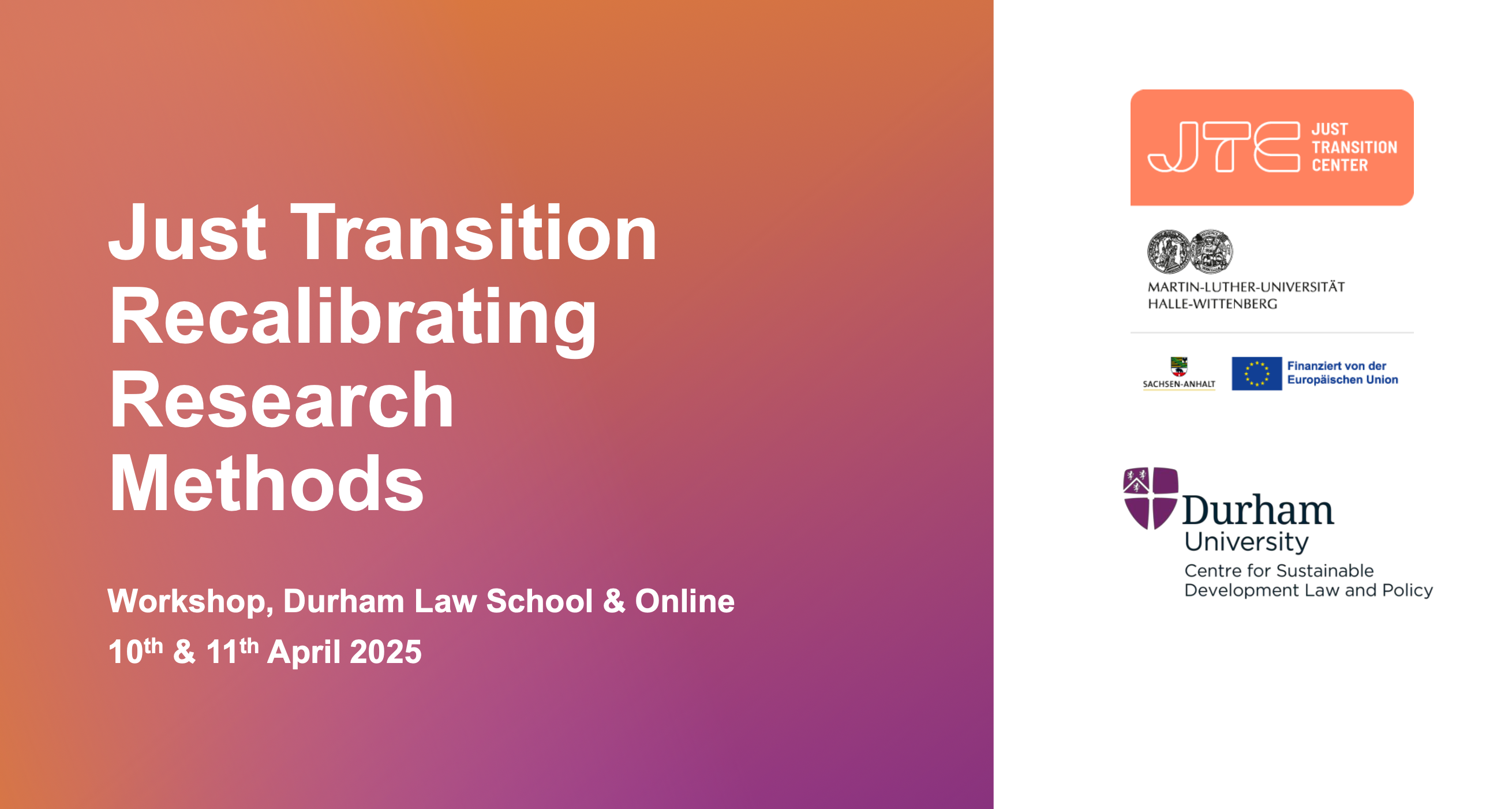JTC-CSDLP Workshop – 10th & 11th of April 2025

Workshop held jointly between the European Centre for Just Transition Research and Impact-Driven Transfer (JTC), Martin Luther University Halle-Wittenberg and the Centre for Sustainable Development Law and Policy, in support of "Just Transitions to a Net Zero World".
Concept note:
We are at a pivotal moment of a number of societal transitions: an era dominated by the burning of fossil fuels - lignite, coal and gas for electricity, diesel and bunker oil for propulsion - is gradually waning, and entire industry clusters are transitioning or declining, while new economic ecosystems are filling the void. Efforts towards digital transformation within sectors such as governmental ministries are hampered by entrenched legacy systems, while IT companies are building energy-intensive AI data centres to process the totality of our digitised collective cultural production, all too often assuming ownership of it. The concept of Just transitions encapsulates the necessity to directly address climate change and transitioning away from our current modes of production, consumption and evaluation of wellbeing and societal progress. The historical roots of the concept lie in the alliances forged between Labour Organizations and environmental justice groups in the 1990s.
Climate change as a societal, environmental, and cultural challenge is permanently at risk of being placed on a holding track in light of geopolitical tension, military conflict and (trade) warfare. The climate impacts that society attempts to ignore all too often, are now manifesting themselves in every country of the world. Policymakers at various levels of governance – from the international to the local – have launched 'just transition' initiatives aimed at mitigating t he economic, social and environmental impacts of these multiple transitions and avoiding disruptive structural change. These initiatives include funding for cutting-edge technologies in material science and fostering social acceptance through youth programmes. Just Transition research is thus not only an interdisciplinary endeavour encompassing aspects of economic, legal, political, social, geographical and environmental processes, alongside advancements in material science necessary for future innovations like solar panels. It also inherently carries an ethical prerogative to succeed as we take responsibility for our current and future societies and ecosystems.
The arrival of the concept at the level of the international climate change regime under the United Nations Framework Convention on Climate Change (UNFCCC) and the Paris Agreement provides a new opportunity to fundamentally shape the Paris Agreement’s preambular imperative of a just transition. The concept of just transitions at the level of international policy and lawmaking is both, mature and novel. In its maturity, it presumes a community and captures distinct claims of emerging and gradually solidifying fairness in international law, dating back to the work of Thomas Franck. In its novelty as a UNFCCC work program, it empowers an interdisciplinary discourse to conceptualize transitions at a global scale that comprise the mature fairness discourse, centred on legitimacy and equity, and connect it with implementable solutions that account for the critical role of academic research in managing consequential effects of transformational societal change.
In this collaborative workshop between the Durham University’s Centre for Sustainable Development Law and Policy, with participation of colleagues of the flagship initiative Just Transitions to a Net Zero World (JusTN0W), and the European Centre for Just Transition Research and Impact-Driven Transfer (JTC) of the Martin Luther University Halle-Wittenberg, we aim to recalibrate our methodological tools by intertwining legal and social scientist approaches and methods in order to analyse the lived reality (what is) and to better incorporate desired outcomes (what should be). Our objective is to explore the plural realities of just transition that are constantly being constructed, negotiated, appropriated, and contested by diverse actors. The emphasis is thus on the plurality of analytical and methodological tools to explore real-life implications of just transition. “Recalibration” signifies an interdisciplinary dialogue and an attempt to transcend disciplinary methodological boundaries by first mapping and contrasting the potential and limits of deductive and inductive, qualitative and quantitative, normative and descriptive methods, before considering how different methodological repertoires can be linked and combined. By critically examining existing methods of knowledge production, we explore new avenues of researching just transition.
Guiding questions are, for example:
- How do we construct knowledge about just transition?
- What approaches & methods do researchers use to conduct just transition research?
- How can just transition issues be addressed within and across disciplines?
- How can just transition research contribute to an inclusive academic discourse while maintaining subject-specific significance?
Main points of contact:
Professor Petra Minnerop
Director of the CSDLP
petra.minnerop@durham.ac.uk
Kate Morris
Senior Business Development Manager
kathryn.l.morris@durham.ac.uk


/prod01/prodbucket01/media/durham-university/attractions-/botanic-gardens-/79619-1920X290.jpg)